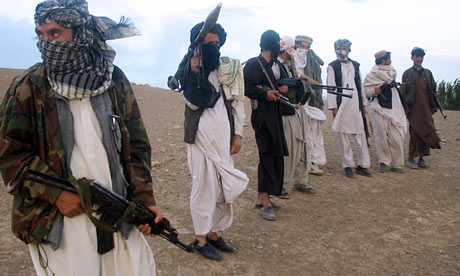Kabul Agrees to Open Taliban Office in New Peace Deal
Afghan Taliban

NEW DELHI: In what seems to be a move toward a peace deal, Afghanistan’s representatives have agreed that the Taliban should open a political office for negotiations with the government.
A statement issued on Monday outlined the agreement reached by 40 delegates at a “non official meeting” that involved the Taliban, government and UN representatives over two-days in Qatar.
The re-opening of the office was a major bone of contention between the Taliban and former Afghan President Hamid Karzai, making peace talks a non-possibility. Afghanistan’s current President, Ashraf Ghani has made clear that a composite dialogue aimed at ending the 13 year long insurgency is a key priority area for the new government.
This time around, however, the major bottleneck toward peace is the presence of US troops in Afghanistan. After the White House announced that the United States will maintain its current 9800 troops in Afghanistan through the end of 2015, as opposed to an earlier plan of cutting the number to 5500, the Taliban issued a statement vowing to push through with violent attacks. Taliban spokesman Zabihullah Mujahid said, “This damages all the prospects for peace, … This means the war will go on until they are defeated.”
Although the US’ announcement no doubt contributed to the talks failing, other factors would have also made the talks a difficult proposition. For one, the rift between the top two leaders of the militant group. The two in question are political leader Akhtar Mohammad Mansour, who favors negotiation, and battlefield commander Abdul Qayum Zakir, a former Guantanamo Bay detainee, who opposes any dialogue with the Afghan leadership. Sources state that the two met recently to address their personal differences, but no headway could be made on the issue of talks, with Zakir of the view that the Afghan government was illegitimate and that real power remained with the US any way.
The announcement of the change in plans of troop withdrawal tilted the position in favour of Zakir, with the Taliban command being clear from the start that the removal of foreign troops would be one of the prerequisites for the commencement of talks.
Monday’s announcement, in fact, coincided with a Taliban attack that killed 18 police personnel in the northeastern province of Badakhshan. The Taliban has already formally announced the start of the “summer offensive” -- referring to a spate in violence that is linked to better weather. This year’s fighting season is of added significance as it marks the first time that Afghan security forces face the insurgents without the full support of US-led foreign combat troops.
The insurgents have already stepped up attacks in the preceding weeks, with a suicide blast outside a bank in Jalalabad killing 33 people on April 18. Although the Taliban denied responsibility for the Jalalabad attack, the group claimed earlier killings in a wave of attacks coinciding with the drawdown of foreign troops. The insurgents slaughtered over 30 soldiers, eight of whom were beheaded, in Afghanistan’s northeastern province of Badakhshan.
The need for peace is all the more crucial given the rising civilian casualties in the troubled country. The UN Mission in Afghanistan has said that the number of civilians killed or wounded in the troubled country climbed by 22 percent in 2014 to reach the highest level since 2009.
The UN agency documented 10,548 civilian casualties in 2014, the highest number of civilian deaths and injuries recorded in a single year since 2009. They include 3,699 civilian deaths, up 25 per cent from 2013 and 6,849 civilian injuries, up 21 per cent from 2013. Since 2009 -- when UNAMA began tracking casualties -- the armed conflict in Afghanistan has caused 47,745 civilian casualties with 17,774 Afghan civilians killed and 29,971 injured.
If the start of the 2016 summer offensive if anything to go by, the situation in Afghanistan is only going to get worse.



